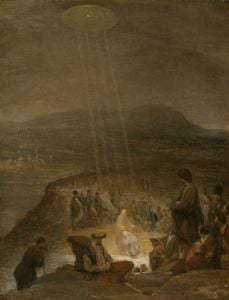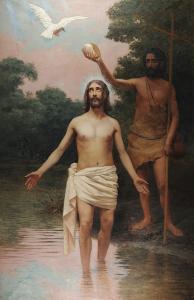 Since the celebration of the Baptism of Jesus always follows barely two weeks after his birth, one can readily conclude that those managing the lectionary readings are purveyors of infant baptism. Those traditions that eschew such a practice, most particularly our Baptist sisters and brothers and those denominations that follow in their wake (sorry! I could not resist), surely would resist such a celebration, but probably do not use the lectionary much in any case. Baptism is about water, of course, and so where else to begin such a celebration than in the beginning?
Since the celebration of the Baptism of Jesus always follows barely two weeks after his birth, one can readily conclude that those managing the lectionary readings are purveyors of infant baptism. Those traditions that eschew such a practice, most particularly our Baptist sisters and brothers and those denominations that follow in their wake (sorry! I could not resist), surely would resist such a celebration, but probably do not use the lectionary much in any case. Baptism is about water, of course, and so where else to begin such a celebration than in the beginning?
My own denomination, United Methodism, has a quite superb ritual of baptism, since the appearance of the 1989 hymnal that offers a brief history of the significance of water in the biblical tradition. It, too begins in Genesis, moves toward the Sea of Reeds, the Jordan River, and finally to the water of Mary’s womb where Jesus lay and from which he emerged, as do nearly all of us. The author(s) of Genesis 1 surmised that all somehow began in water; the primordial state of the creation, before Elohim’s series of actions transformed water into dry land from which arises plants and animals and ultimately human beings. Most scholars assume that this chapter of Genesis was the product of an exilic or post-exilic priestly caste who were intent on maintaining the traditions of the faith of Israel in the face of an ocean of what they saw as paganism all around them, most prominently the Babylonians among whom they had lived for nearly two generations. In short, Genesis and its fixation on a great cosmic ocean served as the opening shot of their attempts to demonstrate how their God, Elohim, was in fact the only God there was, despite the loud and persistent disagreements from nearly all the peoples of the Near East. Genesis 1 is nothing less than a polemic against other ways to construe the origins and continued existence of the earth along with the seas that frame the land and about which they knew very little. Also, Gen.1 is clearly a liturgical event that includes a responsive reading between leader and people, a series of easily memorized convictions about the creation of all that is.
These opening verses of Genesis are full of insights and ideas that were no doubt achieved over many centuries; the text as we have it may have been finally composed in the 6th or 5th centuries BCE, but enshrined in the words are notions far older and deeply cherished. Vs.1 is a summary phrase of what we are about to experience in detail. “In beginning, Elohim created skies and earth.” The opening clause may also be “when Elohim began to create.” Immediately, we can see that the theological struggle to convince believers that God created the world from nothing, thereby securing the certainty that God was in reality all mighty, cannot be derived from Gen.1. This is so because Elohim begins creative work with something already in existence, and that something is water. Earth in the beginning is “tohu wabohu,” usually translated as a “formless void,” or similar attempts to describe roiling waters. That Hebrew locution has become an English word, tohubohu, meaning chaos, and though my computer has just underlined that word in red, indicating that it does not recognize the word, it is in fact English (see the OED for confirmation). I have long thought that these two words were chosen for their sound rather than for their meaning; merely sounding the words together creates a dark and baleful phrase that attempts to capture what we are witnessing before the divine work begins.
And upon the surface of the great sea, named tehom in Hebrew, rested profound darkness. We moderns have a difficult time conjuring this sort of darkness, since we live most of our lives within five feet of a light switch, but in a world lit only by fire, darkness was profound and dangerous and too often deadly. And not only was there a cave-like inkiness on the water, there was also a roaring and howling wind, an “Elohim wind,” as the text says literally, or a “God-awful wind” as one translation hears it. The verb that is used to describe the movement of this wind is a rare one, and has been translated anywhere from “howling” to “brooding.” I choose the more dangerous and active translation, because I hear in the lines an attempted description of a world of chaos before the work of God begins. It is a pitch-dark ocean, without borders, roiled by a hurricane wind. And it is into that terrible scene that God begins the work of creation; “Let there be light,” booms or intones Elohim, “and there was light.”
What sits behind this memorable portrait is the creation of the world according to the Babylonians, a story these Hebrew authors may very well have known. In that tale from the very distant past, the salt sea was named Tiamat and the fresh water rivers were named Apsu. At the mouth of the Persian Gulf these fresh and salt waters mingled, and as a result of what was seen as a sexual act, all the lesser gods and goddesses of the Babylonian pantheon were born: god of sun, goddess of moon, god of storm wind, goddess of the hunt, etc. And chief among these deities was Marduk, the great city god of Babylon itself. Over time, it seemed that the lesser gods, led by Marduk, became restive about the universe’s rule by Mom and Dad. So, they plotted to take over the power. And the plot was a successful one! Marduk lured Tiamat from her watery lair with a series of angry taunts, and while Tiamat in the form of an enormous dragon roared out of the waters to swallow her foolish son whole, the god of the wind blew his huge wind right down her throat, forcing it to remain open wide. Into her gaping jaws Marduk thrust his magic spear, instantly killing his mother. From the top half of her carcass he formed the sky, and from the bottom half he formed the earth. Thus were earth and sky created, according to the Babylonians.
But note the elements that sound quite biblical: the earth is formed from the primordial waters in the form of Tiamat; the name Tiamat itself bears the same consonants as the Hebrew word translated “deep,” tehom; a howling wind is among the elements of the creative act; in the Genesis account Elohim soon employs wind to drive the waters back, thus allowing the dry land to appear. By using these ancient pieces of the older story, the priests announce in no uncertain terms that it is Elohim, not Marduk, who is creator and sustainer of the world. In worship experiences over the years, the people intone these words again and again, reinforcing their certainty that there is no God but their God, no creator but Elohim.
Thus, in the baptism of Jesus, which this Sunday we remember, we all reiterate the primordial work of Elohim in the world’s creation, when we pour the water, either on a new child or in a reconfiguration of our own baptisms. With this rootedness in the ancient tale we proclaim clearly that we worship only the creator of the world, the one called YHWH or Elohim or God. Baptism then becomes far more than a ritual of the sweet action of a minister, carefully cradling an infant. It is nothing less than a loud proclamation that God is God; there is no other god or no other thing that is worthy of our ultimate concern, of our devoted worship. That is why, among many other reasons, that baptism remains one of the sacraments of the Protestant church, one of the two actions, along with Holy Communion, that marks us an ongoing community of Christian faith. The next time you witness or perform a baptism, never forget Genesis and its proclamation of the creator God who brought from primordial water all that is.
(Images from Wikimedia Commons)











